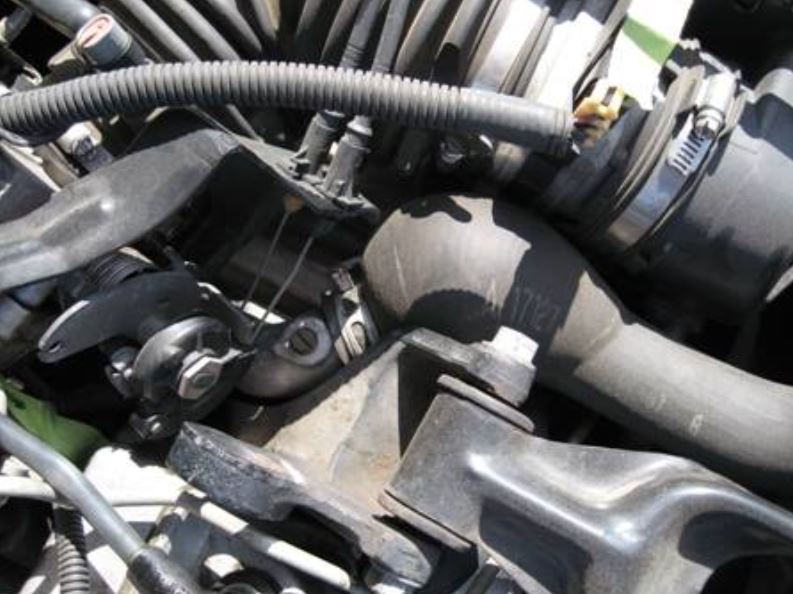Most engines are designed to operate within a specific temperature range (usually 195-220 degrees Fahrenheit) to maintain optimum performance, fuel economy, and emissions control. That being said, there are some GM platforms that don’t even energize the cooling fan until the engine reaches 228 degrees F.
A lot of problems may happen if your engine’s temperature goes above this range. That’s why your engine has a cooling system filled with a (usually 50/50) mix of water and ethylene or propylene glycol (antifreeze). Anything that prevents the cooling system from operating properly can lead to overheating. Some of the most common causes of engine overheating are:
- Coolant leaks resulting in low coolant levels
- Defective thermostat
- Damaged radiator cap
- A restricted radiator
- Faulty cooling fan or slipping fan clutch
- Bad water pump
- Failed coolant temperature sensor
- Leaking head gasket or cracked cylinder head

Note that a leaking head gasket or a cracked cylinder head is typically one of the effects of overheating but in some cases can also be the cause. While there are several ways a head gasket can fail, one of the more serious ways usually not caused by overheating is that one or more of the head gasket’s fire rings can fail, allowing compression/combustion heat to be forced into the coolant jacket, which causes a rapid rise in pressure and temperature.
Note that a leaking head gasket or a cracked cylinder head is typically one of the effects of overheating but in some cases can also be the cause.
– Richard McCuistian, ASE Certified Master Automobile Technician
Because so much depends on your engine’s cooling system, it’s vital to keep it in top shape. But what if the worst happens and you let your engine overheat? Read on to find out what happens when your engine overheats and which parts are affected by this phenomenon.

What Damage Is Caused by an Overheated Car Engine?
Below are some of the most common car engine damage caused by overheating:
Engine Detonation
One of the most dangerous things that can be caused by overheating is engine detonation or engine knocking. Knocking happens when fuel combusts erratically or prematurely inside the cylinder, resulting in multiple flame fronts colliding.
Detonation adds a lot of stress and strain on the engine. If you continue to drive your vehicle as the engine detonates, you also risk damaging its rings, pistons, and rod bearings.
It depends on the engine, but if you start hearing detonation and notice that your temp gauge is in the overheat zone, it may be too late.
Never open a hot cooling system and never pour cold coolant into a hot engine unless it’s running, else you may cause further damage. And if you’re refilling an emptied cooling system, it’s not like pouring water in a bucket. Air can be trapped in many engines and must be worked out carefully or overheating will result.
Seals and Gaskets
While seals and gaskets are made to withstand heat and pressure under normal operating conditions, they can only do so much when your engine overheats. It’s possible for various seals and gaskets to melt or deform during overheating.
Cylinder Head
Cylinder heads, which are made of metal (cast iron or aluminum), expand and warp or crack when the engine is overheated for an extended period of time.
Some metals expand faster than other metals. In fact, aluminum, which is the material often used to make cylinder heads, swells three times faster than cast iron (which is often used in older models). Warped cylinder heads or cracked cylinder heads often result in a loss of compression and/or internal coolant leaks.

Head Gasket
Head gaskets provide a seal between the cylinder heads and block to prevent compression loss. They also seal oil and coolant passages to keep oil and coolant from mixing. As mentioned above, really high temperatures can cause the cylinder heads to swell. This enables the cylinder head to crush the head gasket. Damaged head gaskets, in turn, may cause compression loss between cylinders and may even cause coolant to leak into the cylinders, damaging other parts of the engine. Repairing a damaged head gasket is especially tedious, because you’ll need to remove the cylinder head to access it.
Pistons
When an engine overheats, the pistons may expand so much that there simply isn’t enough room for them to expand anymore. This may cause them to scrape or scuff against the cylinders, damaging both in the process. And if the pistons are damaged, not only do they cause very serious engine damage, it’s also very expensive to have them fixed.
Cracked Engine Block
If the cylinder heads, head gaskets, and pistons can expand and warm, so can the engine block. As the engine overheats for an extended period of time, the superheated areas of the engine block may expand and contract, allowing cracks to form. This often results in fluid leaks (internal or external) and/or loss of compression.
Exhaust Valves
Engine overheating can also cause major damage to the exhaust valves. These valves may stick or scuff in their guides, leading to significant compression leaks.
Radiator and Heater Hoses
Once coolant reaches really high temperatures, it boils. And when it boils in the radiator, it may cause a hose to blow off its clamp. Heater hoses may also burst and explode. Radiators with plastic end tanks can also explode. But remember that hoses can leak or fail and cause overheating as well.

How to Keep an Engine From Overheating and What to Do If It Does
It’s undeniable that repairing damaged engine components from overheating is an expensive affair. As a driver, what can you do to prevent your car from overheating?
You can actually do a lot of things to prevent overheating. Regular cooling system maintenance is the most important one. Make sure to stick to the recommended service intervals and periodically check your radiator, hoses, and other cooling system components to see if they need to be replaced. Keep an eye on your vehicle’s coolant level and top up coolant according to the manufacturer’s specifications. Also, don’t ignore the temperature gauge, because it helps you assess the situation and plan what needs to be done.
When it’s necessary to replace the belt, replace the belt tensioner as well. Tensioners can fail suddenly and cause overheating. High mileage cars (100-150,000 miles) can experience sudden radiator failure, which can destroy the engine before you know it if you’re on a trip.
That said, if your engine suddenly heats up as you’re driving, try to remain calm. Pull the car over and turn the engine off immediately. Let the engine cool off, then assess the situation and fix the cause of the overheating if possible. If you can’t fix the problem on the side of the road (and you usually can’t), have the vehicle towed to a repair facility.
If you absolutely have to keep moving, then keep your vehicle moving slowly. Leaving your vehicle at rest with the engine running is a surefire way to make things worse. Keeping the vehicle moving ensures that some constant airflow goes around the motor. You can also turn on the heater, which pulls the heat away from the engine and into the cabin. If it’s safe, also open all the windows as far as possible.
Remember not to open your vehicle’s hood until it cools down as well. Otherwise, you risk burning yourself in the process. The system’s coolant heats to dangerously high temperatures when a car is overheating. It pressurizes the cooling system and might splash out if you aren’t careful. Scalding coolant will burn your skin and can cause serious injuries.
Monitor your vehicle’s temperature gauge to determine if it’s safe to open the hood. The gauge should move from hot to cool in about 30 minutes. You might need to turn the ignition for the gauge to work, but don’t actually turn the engine on.
Now you know what types of damage an overheating car might exhibit and what to do in case your vehicle overheats. Keep these tips and tricks in mind for your next drive. They might just save you a lot of grief.
Any information provided on this Website is for informational purposes only and is not intended to replace consultation with a professional mechanic. The accuracy and timeliness of the information may change from the time of publication.





























